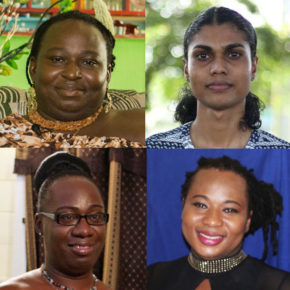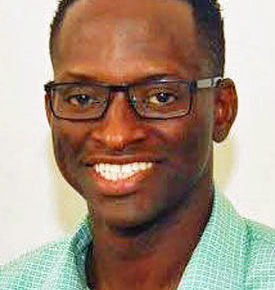Top Caribbean court nixes Guyana cross-dressing law
Colin Stewart is a 45-year journalism veteran. He is the…
The Caribbean Court of Justice today struck down Guyana’s law against cross-dressing. “No one should have his or her dignity trampled on, or human rights denied, merely on account of a difference, especially one that poses no threat to public safety or public order,” the court’s presiding judge stated.

The case arose from the 2009 trial of four trans women whom the magistrate berated for their female attire. He told them that they were confused about their sexuality, that they were men and not women, and urged them to go to church.
In 2010, the four trans women appealed, challenging both the constitutionality of the anti-cross-dressing law and the statements made by the magistrate.
The Guyana publication Demerara Waves described the events of 2009:
At the time of arrest, McEwan was dressed in a pink shirt and a pair of tights and Clarke was wearing slippers and a skirt. A few hours later, Fraser and Persaud were also arrested by the police and taken to the Brickdam Police Station. At the time, they were dressed in skirts and were wearing wigs.
While in custody, Fraser requested legal counsel, medical attention, a telephone call and that the police take a statement. However, those requests were not granted. McEwan, Clarke, Fraser and Persaud spent the entire weekend in police custody and they did not receive any explanation as to why they had been arrested and detained. They first learned of the charges, of loitering and wearing female attire in a public place for “an improper purpose”, when they were taken to the Georgetown Magistrate’s Court on Monday 9th February 2009.
Today’s decision bolsters the human rights of transgender residents of Guyana, but the country still has unenforced laws against buggery (punishable by a life sentence) and “attempts to commit unnatural offences” (punishable by up to 10 years in prison).
This is a joint press statement issued today by Guyana Trans United (GTU), the University of the West Indies Rights Advocacy Project (U-RAP) and Guyana’s Society Against Sexual Orientation Discrimination (SASOD):

Highest Caribbean court strikes down Guyana’s cross-dressing law
Trans litigants and Caribbean civil society groups welcome the landmark ruling
In a greatly anticipated decision delivered on Tuesday morning, November 13, Guyana’s final court of appeal, the Caribbean Court of Justice (CCJ), ruled unanimously that the law which makes it a criminal offence for a man or a woman to appear in a public place while dressed in clothing of a different gender for “an improper purpose”, violates the Constitution of Guyana and is void.
The judgment of the Hon. Mr. Justice Saunders, the newly appointed President, said, “No one should have his or her dignity trampled on, or human rights denied, merely on account of a difference, especially one that poses no threat to public safety or public order.”

The four appellants, Gulliver (Quincy) McEwan, Angel (Seon) Clarke, Peaches (Joseph) Fraser and Isabella (Seyon) Persaud, are trans women who were arrested and convicted in 2009 of the cross-dressing offence found at section 153(1)(xvlvii) of the Summary Jurisdiction (Offences) Act, which is an 1893 law.
The four spent three nights detained at a police station after their arrest for the minor crime. At their trial, the magistrate told them that they were confused about their sexuality, that they were men and not women, and urged them to go to church. They pleaded guilty to the cross-dressing offence because, as the President of the CCJ pointed out, “it was more convenient and less expensive to do so than to retain counsel to dispute the charges”, and were ordered to pay a fine of $7,500 Guyana dollars each.
In 2010, the four appellants and the Society Against Sexual Orientation Discrimination (SASOD), brought an action challenging the constitutionality of the offence and the statements made by the magistrate. The CCJ said that, given SASOD’s objectives, the courts below had no good reason to strike the organisation from the proceedings in 2013. The CCJ said courts should take a liberal approach to standing in litigation that seeks to ensure the Constitution is properly interpreted and applied.
First-named litigant and co-founder of Guyana Trans United (GTU), Gulliver McEwan, elatedly reacted that “the whole trans community in Guyana is very happy today. I have always said that we should know what the law expects of us before we act and I am pleased that the court agreed that this law is vague.” McEwan added: “It was very important for us to be heard and get justice.” Discrimination is a part of everyday life for many trans Guyanese. Isabella Persaud, one of the appellants said, “We are always treated like trash.”
The CCJ looked at the historical context of this post-slavery vagrancy law and concluded that it was a law from a different time that no longer served a legitimate purpose in Guyana. The panel of CCJ judges comprised the President, the Hon. Mr. Jacob Wit, the Hon Mr. Justice Winston Anderson, the Hon. Mme. Justice Maureen Rajnauth-Lee and the Hon. Mr. Justice Denys Barrow.
The entire panel of five judges concluded that the law was unconstitutionally vague. The Court said that laws must define criminal offences with “sufficient clarity that ordinary people can understand what conduct is prohibited.” The majority concluded that the vagueness left transgender persons “in great uncertainty as to what is and is not allowed” and also gave law enforcement virtually unlimited discretion in applying the law.
A majority of the judges also found that the law resulted in transgender and gender non-conforming persons being treated unfavourably because of their gender expression and gender identity.
Justice Winston Anderson in a separate decision noted that forms of dress by themselves are not objectionable and that “the essence of the crime … appears to consist … entirely of the state of mind of the persons engaged in otherwise perfectly innocent conduct.” He concluded that “our jurisprudence properly accepts that intentions by themselves are not constitutionally the proper subject of the criminal law.”
The CCJ strongly criticized the comments of the magistrate at the 2009 trial, describing them as “inappropriate.” The majority said that “judicial officers may not use the bench to proselytize” and went further to say that the remarks “went beyond proselytizing” and “revealed stereotypical thinking” about transgender persons.

Joel Simpson, Managing Director of SASOD, lauded the decision as “a clarion call to engage state actors on how the law engenders social and economic exclusion of disadvantaged groups. Trans persons remain vulnerable to arrests for small crimes like loitering in Guyana’s colonial-era vagrancy laws which are still on the statute books.” He added that “The Court’s ruling that SASOD has standing to bring a claim on behalf of the broader community of persons we represent will allow civil society groups to take legal action when rights of its members are violated. This is a victory for human rights and justice in the Caribbean.”
Colin Robinson of Trinidad and Tobago’s Alliance for Justice and Diversity, who was among representatives in court on Tuesday morning in Port of Spain, said, “There’s so much to celebrate about Caribbean justice today—about Caribbean lawyers, about Caribbean judges, about four pioneering trans women who have expanded justice for so many Caribbean people the law fails, but what we in Alliance for Justice and Diversity celebrate most is the CCJ’s ruling that organisations like ours must have access to the courts to advocate for our constituents.”
The legal team for the appellants and SASOD was led by human rights lawyer, Douglas Mendes SC, a co-founder of and Advisor to the Faculty of Law, The UWI Rights Advocacy Project (U-RAP), which has been involved in the case from the outset. Dr. Arif Bulkan, also a member of U-RAP, and then attorney-at-law Mr. Gino Persaud, appeared in the earlier stages of the case. The legal team also included Mr. Nigel Hughes (Guyana), and Ms. Mishka Puran (Guyana), Clay Hackett (Trinidad and Tobago) and Isat Buchanan (Jamaica). Lead counsel Douglas Mendes SC described today’s judgment as one that “will be acknowledged as a significant contribution to Caribbean jurisprudence, especially because of its insistence on the need to give due respect to everyone’s humanity.”
Related articles:
- Guyana’s cross-dressing law unconstitutional- CCJ rules (November 2018, Demerara Waves)
- ‘As a trans person in Guyana, you feel you’re in a jail yard’ (
- Guyana Pride: Anglican bishop lends support; opponents lose (
- Guyana marchers oppose repeal of anti-LGBT laws (, 76crimes.com)
- Guyana plans referendum on its anti-gay law (April 2017, 76crimes.com)
- Activists challenge Guyana’s anti-trans stance (March 2017, 76crimes.com)
- Support for LGBT community grows in Guyana (March 2016, 76crimes.com)
- Guyana president takes aim at his nation’s anti-gay law(January 2016, 76crimes.com)
- Nations push Guyana to repeal anti-LGBTI laws (July 2015, 76crimes.com)




African human rights body must set a better example